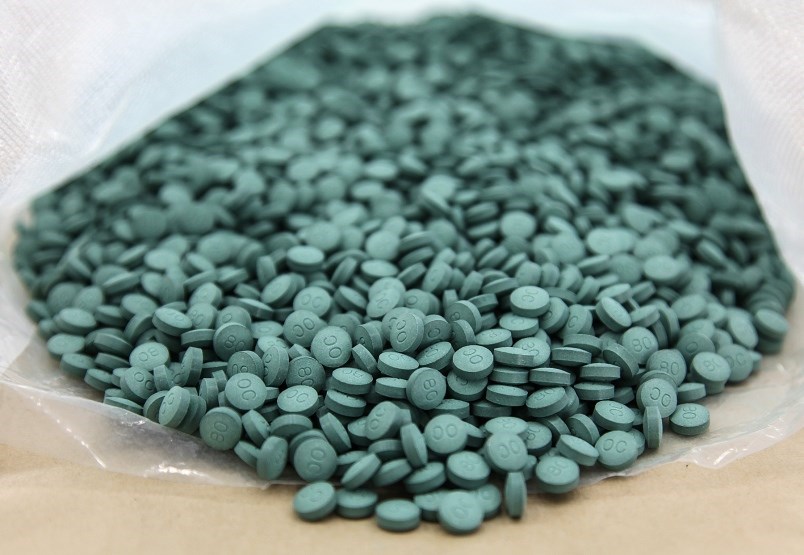The previous year is when Donna Howard, 38, was caught in Surrey with a purse full of “dial-a-dope” bags containing fentanyl, heroin and cocaine. She is now serving a 22-month conditional sentence.
Why Chau is in prison and Howard is serving her sentence at home is best understood via the facts of both cases, their circumstances at the time of the arrests and the magnitude of the offences, which they pleaded guilty to in court.
Their arrests are not connected, and the pair doesn’t know each other.
They were both, however, sentenced in July.
In both cases, the judges emphasized in their sentencing reports the devastation fentanyl has caused in B.C., with more than 100 people per month continuing to die in the province of an overdose.
Fentanyl or its analogues has been detected in at least 82 per cent of the deaths since 2017, with Vancouver, Surrey and Victoria hardest hit by lives lost, according to data from the B.C. Coroners Service.
Only four per cent of drug deaths in 2012 involved fentanyl.
The cases of Chau and Howard provide insight into the supply side of the crisis and reveal the motivation behind the need to sell the synthetic narcotic, despite the well-publicized warnings from the coroners service, health officials and law enforcement that fentanyl kills.
The cases also serve as a progress report on what type of punishment is being meted out in the courts almost seven years after fentanyl began showing up in a big way in drug samples tested from the Insite supervised injection site in Vancouver.
“Our communities have been plagued by the opioid crisis for quite some time now,” said Provincial Court Judge Andrew Tam in sentencing Chau.
“Because of the uncertainty and inconsistency of street drugs, using them is effectively a gamble on one’s life. Yet the addictive nature of these substances results in many unable to escape the grips of their dependence.”
He described Chau’s motivation to sell drugs such as fentanyl as “nothing more than greed,” noting Chau was not an addict and that he grew up in “modest surroundings” provided by his refugee parents originally from Vietnam.
“There was no extenuating need for this money,” Tam said. “Mr. Chau simply wanted to take a shortcut to financial success.”
$2,000 and $3,000 per week
Chau’s case dates back to Nov. 2, 2017 when police executed two search warrants at apartments in Kelowna — one where Chau and his associates resided from time to time and another considered a stash house for drugs.
Police seized 282.9 grams of cocaine, 145.61 grams of substances determined to be either fentanyl, heroin mixed with fentanyl or fentanyl mixed with carfentanil. The street value of the haul was estimated at $43,000.
Also seized was $7,355 in cash, cell phones, a calendar setting out which member of the organization was going to be working a particular shift, baggies used to package product, mixing equipment and score sheets.
The story the court heard about Chau is that he got involved in the drug trade after finishing high school and studying at BCIT for one year in an electrical apprenticeship program.
Thereafter, he felt a little “adrift” — as his lawyer put it — and didn’t really know where to go with his life. At some point, he met Anh Quoc Nguyen, who later became a co-accused in the Crown’s case against Chau.
Nguyen was said to be “higher up in the hierarchy” of a drug trafficking organization, according to details in the judge’s written reasons for sentencing.
“Because of his association with Mr. Nguyen, he was parachuted into the organization immediately as a mid-level trafficker,” Tam said.
“In the usual case, someone would begin by dealing at the street level. But in Mr. Chau’s case, he started immediately by being responsible for supplying drugs to lower-level dealers.”
At the time of his arrest, Chau was earning between $2,000 and $3,000 per week.
He had no previous record before the arrest. Since his arrest, he has been working for an uncle who does home renovations, and is being paid $18.25 per hour.
“I am satisfied that Mr. Chau was able to extricate himself from the criminal element with whom he was associating,” said Tam, before giving reasons for a five-year sentence.
“Addiction to drugs and in particular fentanyl and its analogues continues to be a health crisis in our communities. Indeed, the problem has gotten worse, not better, since the introduction on the streets. Both general deterrence and denunciation therefore mandate a harsh sentence.
 BC Coroners Service data shows 7,596 people in B.C. died of a drug overdose between Jan. 1, 2016 and May 31, 2021. File photo Dan Toulgoet
BC Coroners Service data shows 7,596 people in B.C. died of a drug overdose between Jan. 1, 2016 and May 31, 2021. File photo Dan ToulgoetThe five-year sentence — described as “global” by Tam — saw Chau get three years for possession of cocaine for the purpose of trafficking and two years for the same charge related to methamphetamines.
It was the trafficking charges related to heroin, fentanyl and carfentanil that got Chau the five-year term. Up until the day of the sentencing in July, Chau had not told his parents or extended family about the offences “for fear of upsetting and disappointing them,” according to Tam’s sentencing report.
The sentencing hearing for Chau saw the Crown rely on 21 previous cases related to trafficking in fentanyl while Chau’s lawyer relied on seven cases. Sentences in those 28 cases ranged from 28 months to seven years.
'Spitballs of fentanyl'
Howard’s case dates back to the afternoon of Friday Nov. 4, 2016 when police stopped a car in an area in Surrey known for drug trafficking. Howard was a passenger in the car driven by another female.
She told police she had drugs in her purse but said the driver had nothing to do with selling them. Police found five bags of drugs in Howard’s purse. Four of the bags were labeled “Friday, day Saturday, night Saturday and day Sunday.”
The drugs included 65 “spitballs” of fentanyl and 155 counterfeit OxyContin pills later analyzed as fentanyl, with a total weight of 51.47 grams. Police also found 14 “spitballs” of a heroin-fentanyl mix weighing 1.63 grams and 235 baggies of cocaine weighing 115.39 grams.
The estimated street value was $14,320.
When questioned after the arrest, Howard told police at the Surrey RCMP detachment that to the best of her knowledge she did not have any fentanyl in her purse.
In fact, she said, she didn’t sell the drug because a friend had died from a fentanyl overdose. Howard also told police she was a former drug user who got sober in jail and was on methadone, but forced to sell drugs because she couldn’t find a job.
“Counsel for Ms. Howard submits that Ms. Howard was not in fact a recovered addict and that she was selling drugs to fuel her addiction,” said Provincial Court Judge Mark Jette in his sentencing report.
Jette noted Howard had a “troubled history” and that when she was 12 years old, her mother started a relationship with a man who was physically abusive towards her and her sisters.
She began to run away from home and spent time on the Downtown Eastside, “where she associated with negative peers.” She left home for good before her 17th birthday.
Howard was diagnosed with bipolar disorder as a teenager and has struggled with depression as an adult. In 2012, she became addicted to heroin and was charged with trafficking.
She is the mother of two children, aged 16 and 19, and separated from their father years ago, cycling through a series of unhealthy relationships leading up to the 2012 trafficking offence.
'Particularly dangerous'
Howard told the court she has not used illicit drugs since 2018 and that she attended night classes at BCIT from 2017 to 2019. She has since found work in marketing at a construction company.
A letter to the court from her employer described Howard as a valued employee who would be greatly missed, if she were to go to jail.
Jette said he recognized Howard’s efforts to leave her previous life behind, but pointed out she had refused to pursue programming, counselling, treatment or other supports in her recovery.
He also found it “particularly troubling” that some of the drugs seized by police in the arrest were counterfeit OxyContin pills that contained fentanyl.
“These pills would have been particularly dangerous for the unwary street drug user, as well as for those who are not experienced consumers of street drugs,” he said, before outlining his reasons for a conditional sentence.
“This aspect of her history, together with the relatively high level of moral blameworthiness arising from these circumstances of the offence itself, and her return to the dial-a-dope drug trade after her prior conviction, lead me to conclude that a suspended sentence would not be a fit disposition in this case.”
Howard’s sentence includes a list of conditions, including spending the first 12 months under “house arrest” at her residence near Terrace, unless given written permission from a supervisor to leave for work or “other compelling reasons.”
The judge said he was satisfied that Howard could be supervised outside of jail without endangering the safety of the community, noting the progress she has made on her own since the offence was committed.
At the same time, he noted documents filed by the Crown show overdose deaths in the province continue unabated, pointing out the crisis had “firmly taken root” at the time of Howard’s arrest in 2016.
Coroners service data shows 7,596 people in B.C. died of a drug overdose between Jan. 1, 2016 and May 31, 2021. A total of 956 people died in Surrey and 290 died in Kelowna during that period.
The coroner is expected to released more data on overdose deaths before the end of the month, including type of drugs involved in the deaths. Fentanyl is again expected to be the number one drug associated to the deaths.
@Howellings



